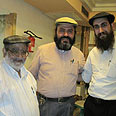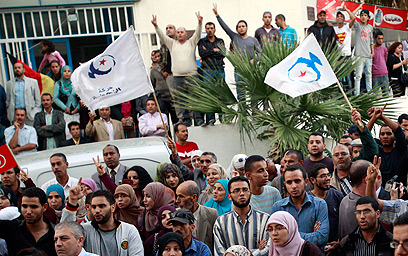
Islamist victory casts shadow over Tunisian Jews
First free elections in Tunisia see moderate Islamist party rise to power with massive victory but Tunisia's Jews are divided over how it will all play out for them
The unprecedented voting rate raised hopes that Tunisia is in fact becoming the first democracy to come out of the Arab Spring but these hopes are somewhat overshadowed by the expected victory of the Islamist Ennahda ('Resurrection') party.
With election officials still counting the ballot papers, the Ennahda party said its own, unofficial tally showed it had won Sunday's vote. Like Turkey's Recep Tayyip Erdoğan, the Ennahda party line believes in a combination between modern and Islamic values.
Seeking to reassure secularists in Tunisia and elsewhere who see a threat to their liberal, modernist values, party officials said they would bring two secularist parties into a broad interim coalition that would govern the country.
In spite of promises to the contrary from party leader Rachid Ghannouchi, many of the country's secular citizens fear that their way of life will now begin to change.

Ennahda party supporters celebrate victory (Photo: EPA)
While Ghannouchi is considered a moderate leader, many of his party members and no less important – many of his voters support extreme Islamist views, something which could affect the country's Jewish minority.
Tunisia's Jewish community now numbers less than 2,000 Jews following years of persecution in a community that once numbered over 100,000 Jews.
"It doesn't matter to us whether the leader is Ghannouchi or anybody else as long as there's a democracy like everyone keeps promising," said Rabbi Benjamin Hatab who serves as the head of the main synagogue in the country's capital in Tunis. "We have no problem with Islamic leaders."
Rabbi Hatab explained that even before the elections Ghannouchi attempted to lessen concerns among the secular citizens and Jews in particular. "He declared that the country would not change and that the only difference would be that it would be more democratic than Ben Ali's Tunisia.
"Ghannouchi promised to create jobs for the younger generation and even sent a delegation to Djerba to reassure the Jews there that everything would ok and that they have nothing to worry about. His representatives even brought gifts to Tunis' Jewish nursing home."
Tunisia's historic elections even included a Jewish candidate – Jacob Lellouche who is running on the Union, Popular and Republican Party list. Yet as Rabbi Hatab explained, at most Lellouche is aspiring to cooperate with other candidates.
Beginning of the road
Israel, does not even factor into the elections. Rabbi Hatab noted that as a whole the contenders declared that they have no business with Israel, and he accepts this: "We've lived with Muslims our entire lives and we believe things will be ok."
Hai Camus, a member of Djerba's Jewish community told Ynet that he avoided voting for Ghannouchi instead choosing to vote for a more liberal candidate. Yet unlike Rabbi Hatab, he is concerned with the Islamist party's rise to power.
"This is the beginning of their road and I believe that right now they won't be taking any extreme steps but no one can make promises about what will happen two or three years from now," he warned.
Explaining his view Camus said: "Ghannouchi is an Islamist and even if he says he isn't an extremist – his extremist supporters are the ones that elected him and brought him to power. In the last few weeks the extremists stirred up eligible voters to vote for him so he belongs to the extremists.
Camus also believes that the Tunisian Jews' yearning to make aliyah to Israel has gotten an extra boost from the election results: "We always want to make aliyah, it's nothing news, we need to make aliyah and we may do so in the near future God willing".
Haim Damari, who made aliyah from Tunisia when he was eight years old and conducts tours in Tunisia, believes that Tunisia will remain on relatively good terms with its Jewish population. Much of this stance is based on the economic reality in Tunisia.
"Tunisia doesn't have oil or other resources, all it has its tourism industry – 10 million tourists a year… I don't see any leader endangering that."
- Follow Ynetnews on Facebook










